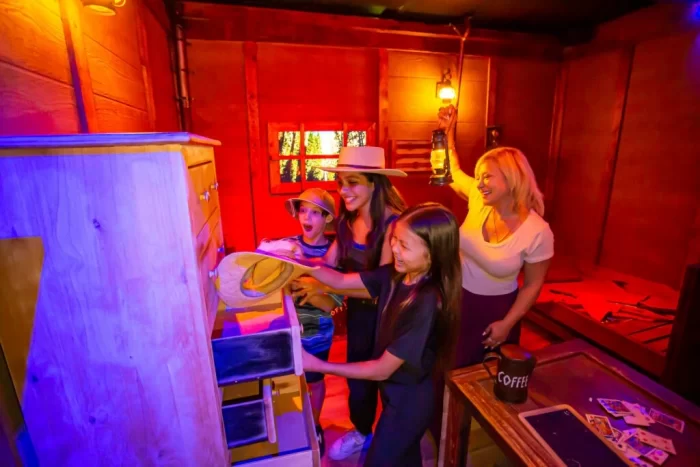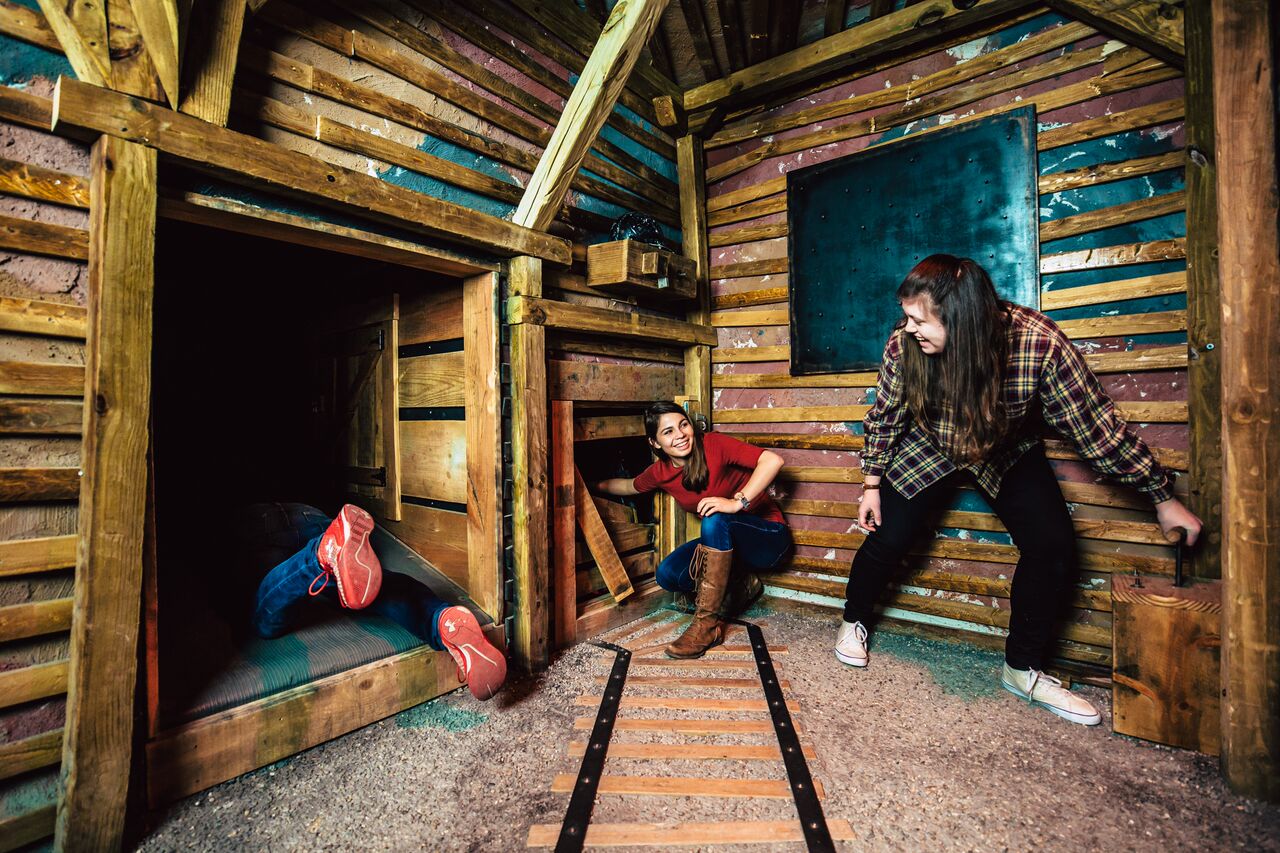Experience Thrilling Escapes at the most effective Escape Room in Seattle WA
Wiki Article
Obstacle Your Mind With Our Intriguing Escape Room Puzzles and Clues
Beginning on an escape room experience offers a complex experience that blends cognitive difficulties with immersive storytelling. Each area, thoroughly crafted with unique styles, attracts participants into a globe where logic, observation, and physical problems converge.The Art of Problem Layout
The art of puzzle design in getaway rooms is a imaginative and thorough process that calls for a deep understanding of both cognitive and emotional interaction. Crafting an effective puzzle involves stabilizing complexity with solvability, making sure that individuals remain challenged yet not bewildered. This balance is crucial, as it promotes a feeling of success and promotes ongoing involvement.Puzzle designers need to take into consideration different cognitive abilities, such as pattern acknowledgment, deductive thinking, and spatial awareness. These components must be intertwined seamlessly within the narrative of the getaway space, boosting the immersive experience. Psychological involvement is equally important; challenges should evoke interest, enjoyment, and periodic frustration, motivating individuals to be determined and inevitably do well.
Focus to information is extremely important. Every hint, prop, and system needs to be thoroughly created and checked to make certain capability and comprehensibility within the story. Developers commonly iterate on their creations, incorporating feedback from examination teams to fine-tune trouble levels and remove obscurities.

Kinds of Escape Room Obstacles
Recognizing the intricacies of puzzle design naturally results in an exploration of the varied kinds of obstacles encountered in escape spaces. These difficulties can be extensively classified into physical challenges, logic problems, and observational puzzles, each offering unique forms of engagement and cognitive excitement.Physical challenges need individuals to engage with their atmosphere, commonly involving tasks such as assembling items, adjusting devices, or revealing concealed areas. These obstacles engage tactile detects and spatial thinking, motivating team effort and hands-on analytical.
Logic challenges, on the various other hand, need analytical thinking and pattern acknowledgment. Individuals could be entrusted with translating ciphers, resolving mathematical problems, or locating links between relatively unconnected hints - best escape room. These puzzles are made to check the players' deductive thinking and intellectual expertise
Observational problems rely upon keen attention to information. Gamers should inspect their environments to identify subtle tips, inconsistencies, or hidden messages. These obstacles commonly necessitate a sharp eye and an ability to regard connections that might ignore.
Strategies for Success
Attaining success in escape spaces requires a thoughtful blend of approach and collaboration. Team effort is extremely important; players must leverage their cumulative staminas to address complex problems efficiently. Splitting jobs according to individual abilities can streamline the process-- those with a propensity for pattern acknowledgment can deal with aesthetic problems, while sensible thinkers tackle series and puzzles.Effective communication is an additional cornerstone of success. Sharing explorations without delay avoids copied initiatives and ensures everybody continues to be on the same page. Utilizing a central location to place discovered items can assist track progress and prevent missing out on essential clues.
Time management is equally vital. Allot a particular amount of time to every challenge, preventing long term focus on any single difficulty. Switching puzzles or looking for aid from teammates can provide fresh perspectives. if development stalls.
It's likewise advantageous to acquaint oneself with usual retreat space motifs and puzzle types ahead of time. Recognizing potential challenge styles, such as ciphers or lock combinations, can speed up problem-solving.
Lastly, maintaining a positive and made up mindset under stress can considerably impact efficiency. Tension can shadow judgment, so maintaining tranquil makes sure clear thinking and effective collaboration, bring about a higher chance of effectively running away.

Advantages of Escape Rooms
Involving in retreat areas supplies a multitude of advantages that expand beyond mere entertainment. These immersive experiences serve as a robust platform for developing essential thinking and analytical Home Page abilities. Individuals are called for to assess hints, determine patterns, and create options under time restrictions, fostering imagination and cognitive versatility.
Additionally, getaway rooms are a powerful tool for enhancing team effort and interaction. The joint nature of these tasks requires reliable interaction and sychronisation among employee. This atmosphere encourages participants to articulate their thoughts plainly, pay attention proactively, and work synergistically towards a common objective, therefore enhancing interpersonal abilities.
Moreover, retreat rooms offer an excellent method for stress alleviation and psychological renewal. The gripping nature of the difficulties enables people to divert their focus from daily stressors, promoting a feeling of success and well-being upon resolving the problems. This can bring about enhanced mental wellness and increased productivity in various other areas of life.
Lastly, these experiences usually require creativity and resourcefulness, which can translate into ingenious problem-solving capabilities in professional settings. By engaging in getaway areas, people can hone a varied ability established that applies in different real-world scenarios, making them go to my site a useful addition to any individual or specialist development plan.
Popular Themes and Scenarios
Digging right into the diverse globe of escape areas discloses a myriad of prominent themes and scenarios that mesmerize participants and heighten the immersive experience. Among the most cherished themes are those that transfer gamers right into sensational realms or historic durations. As an example, old Egyptian burial places, middle ages castles, and pirate experiences are perennial faves, allowing participants to address problems within richly thorough settings that evoke a sense of experience and discovery - escape room.Another widespread motif is the enigma and investigator genre, where players discover themselves in the role of sleuths addressing a crime or uncovering keys. These situations commonly feature elaborate storylines and a collection of interconnected ideas that require keen observation and deductive thinking to unravel.
In addition, sci-fi and scary themes hold significant allure, drawing on the intrigue of futuristic technology or the adventure of navigating haunted research laboratories and houses. These scenarios frequently include innovative props and special effects, improving the realistic look and tension.
Lastly, several retreat spaces attract inspiration from pop culture, creating experiences based upon precious books, flicks, or television programs. This can engender a sense of knowledge and exhilaration, as individuals involve with circumstances that pay homage to their favored narratives.
Final Thought
The detailed layout of retreat area challenges and clues uses a special mix of cognitive obstacles and immersive narration. By participating in numerous sorts of physical, rational, and empirical problems, participants refine vital thinking and team effort skills. Employing effective methods enhances the total experience, highlighting the complex advantages of retreat rooms. Popular styles and circumstances better enhance the adventure, making retreat spaces a instructional and compelling activity for boosting mental skill and analytical capacities.Each space, thoroughly crafted with unique themes, attracts individuals right into a globe where logic, observation, and physical challenges merge.The art of puzzle style in getaway rooms is a precise and creative process that calls for a deep understanding of both cognitive and emotional interaction. Crafting a successful puzzle entails balancing intricacy with solvability, ensuring that individuals continue to be tested yet not bewildered. The gripping nature of the obstacles enables individuals to more divert their focus from daily stress factors, advertising a sense of accomplishment and wellness upon fixing the challenges.The intricate layout of escape area puzzles and clues provides a special blend of cognitive obstacles and immersive storytelling.
Report this wiki page